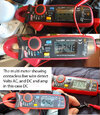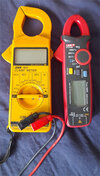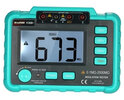I have talked many times about doing electrical work without test equipment, and I have to admit, my loop impedance tester, and my RCD tester my son now has, so I can't do all the testing I would like. However the basic testers I still have, low ohm tester with 200 mA test current, insulation tester using 250 and 500 volt DC, and an array of meters this

is likely the main one, which can measure volts AC and DC and non contact, Amp AC and DC non contact, and ohms, the old one

also measured frequency, also use the insulation tester

and between the two I can test most things, and when required I borrow the meter from work.
It is so easy to measure what current is being used, and it seems likely in this case nothing wrong with the MCB, it is simply doing its job. But the meters cost money, the yellow one very old, before 1997 as bought in Hong Kong when still British, seem to remember about HK$ 250, the other two much newer, around £35 each, they are all cheap meters, as meter go, one can easy pay over £100 for them, the ones shown are likely the cheapest one can buy to measure down to 0.001 amp AC and DC so can test earth leakage.
Yes I could test mA with wires with cheaper meters, but not as easy, but it is no good guessing, measure, then you know for sure, wiring or MCB. Even the pros make mistakes, I remember connecting 25 x 110 volt 60 watt fluorescent lamps to a 16 amp MCB and it tripped, using the clamp-on I found using around 20 amp, so no wonder it tripped, changing the tapping from 110 to 127 on first 20 units cured problem. But without the meter I would not have realised what was causing it to trip.






